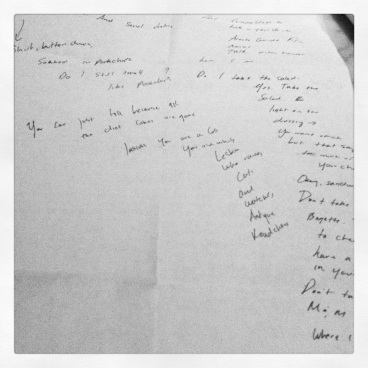There have been many agitating decisions made in the dawn of Trump’s presidency, but one of the most alarming developments is the triumphant return of the Blind Carbon Copy e-mail – simply known as the bcc. If you’re one of those individuals who unnecessarily turn nouns into verbs and gerunds, I speak of being “bcc’d” or “bccing you.”
The bcc practice has been around for quite some time, but my disdain for it goes back as far as February of 2012, when I started writing this tirade. The history of the Carbon Copy (cc) supposedly begins in an era when memos were still written by typewriters and on carbon paper. Though the Blind Carbon Copy (bcc) existed pre-e-mail, it has become an e-mail-era phenomenon. Please note that the aforementioned sources for the previous historical and etymological explanation are Yahoo! Answers, Quora, Wikipedia, and StackExchange, so it is, by today’s standards, impenetrably factual and if you disagree, I will crush your feelings.
Somehow, the e-mail bcc extended beyond the realm of passive aggressive workplace practices and seeped into the world of social invitations. You’ve experienced it before – an e-mail appears in your inbox that serves as an invitation to a gathering, a wedding, a séance, a lesbian dance party that begins at 12 PM and ends at 3 PM, or, most recently, a protest. The e-mail is sent from the sender to the sender with your e-mail as the sole entry in the bcc field leaving you to wonder, “Who the hell is getting this e-mail other than me?”
To be clear, I believe bccing is an acceptable practice in most circumstances, especially for events that require a vigilant eye on privacy. However, I detest the bcc practice for intimate social gatherings like a non-political house party (do those exist anymore?), a non-political birthday picnic (do those exist anymore?), or a non-political dinner with girlfriends (do those exist anymore?).
Since I recently turned 30, I often play the cost-benefit analysis game for social appearances that require my being out past my 10 PM bedtime. I’d like to know in advance if my weekend viewing of “Chill with Bob Ross” on Netflix is worth nixing for an interesting mix of people. After all, Bob Ross and his landscapes are wonderful all of the time, but I can’t say the same for some people. How am I supposed to choose between a painting premised on a Van Dyke Brown color palette or, similarly, a gathering of dykes of color, if I can’t see the invite list?
I’d also like to know in advance what kind of social game I should bring. Will I find a friend? Will I have to familiarize myself with the Marxist-Leninist policies of Venezuelan President Hugo Chavez? Will I need to know Joss Whedon’s entire filmography because it supposedly extends beyond Firefly? As of late, I’d like to anticipate if this crowd of people is a La La Land, Moonlight, and/or Hidden Figures crowd.
Most of all, I’d like to know the associations you make when you start compiling a list of people in your e-mail’s “to:” field. That lump of names, sequenced in a somewhat conscious order, is a fun source of over analysis and overthinking. A guest list is a stream of consciousness wherein the writing of one person automatically necessitates thinking of another person. At times, I understand why I am juxtaposed next to certain people: I’m lumped with all the Vietnamese people, all of the people who are most likely to bring a carbonated beverage to a potluck rather than something substantial, etc. However, at least once, I have thought to myself, “Why did she think of me after that fucking weirdo? Am I a fucking weirdo too?”
Finally, I miss the days of contemplating my standing in a social hierarchy based on my placement in the Gmail “to:” list, which is undoubtedly tiered like this:
- First third of names: Indisputably the most important people invited. A few of these individuals may be beneficiaries of your workplace benefits and/or life insurance should you die. If these individuals fail to show up to your gathering without explanation, they will no longer be the beneficiaries of your workplace benefits and/or life insurance should you die.
- Second third of names: Fun acquaintances that bring a lot of non-embarrassing joy to your social circles. These individuals have not thrown up in your bathroom sink yet, which is great.
- Last third of names: Miscellaneous mix of people who are invited for reasons included, but not limited to: ex-boyfriend or girlfriend who you are trying with much failure to “just be friends with”; people you once loved as friends and/or family, but have since voted for the opposite political party; and individuals who bring a lot of joy to your social circles, but who have already thrown up in your bathroom sink twice.
Thus, in this difficult time of poor public policy and the gradual decay of civic dialogue, I’d like to swing back in the direction of just saying no the Blind Carbon Copy. If you don’t want your guests to frenetically ruminate their place in your/the universe, I would suggest the following:
Find an obvious locomotive (first person) and caboose (last person) for your invite list. By obvious, I mean your partner, your mother, your self-proclaimed best friend, hdr29@hrcoffice.com, etc. Then, in the middle part of the e-mail train/chain, alphabetize everyone else. Odds are, all the Vietnamese people will still end up lumped together and all your attendees have the appropriate amount of information to assess how quickly this non-political gathering of people will transform, inevitably, into a political one.
